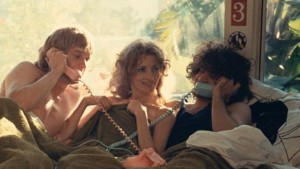STUDIO: Eclipse/Criterion | DIRECTOR: Agnes Varda | STARS: Viva, Jerry Ragni, Jim Rado, Shirley Clarke, Sabine Mamou, Mathieu Demy
RELEASE DATE: 8/11/15 | PRICE: DVD $44.95
BONUSES: none
SPECS: NR | 306 min. | Drama/documentary | 1.37:1/1.66:1 widescreen | mono
One of the most enjoyable things about the work of Agnes Varda is the diversity of her subject matter. While some of her colleagues in the French New Wave distinguished themselves by exploring the same scenarios from various viewpoints (think Chabrol, or especially Rohmer), Varda has a body of work that impresses because of the sheer variety of topics she has covered.
That fact is very evident in this five-film box, in which the films are related only by the fact that she shot them in California. While none of the films are as good as her masterworks (Cleo From 5 to 7, Vagabond), they are all vibrant and imaginative, most especially her “hippie movie,” Lions Love (1969).
The first film in the set is a playful short about a relative that she first met when she moved to the West Coast in the late Sixties. Uncle Yanco (1967) finds Varda making a colorful, cleverly edited “nouvelle vague” film, in which she profiles painter Yanco (her father’s cousin), while underscoring the notion that the reunion we are seeing has been recreated for the camera.
Black Panthers (1968) is a very different kind of short: a straightforward documentary chronicling a rally held to protest the imprisonment of Panther leader Huey P. Newton. The film is timely once more because the main goal of those interviewed in the film is to expose the violent way in which black citizens are treated by the police.
Varda made two overlapping films when she revisited L.A. in the late Seventies. The first, Mur Murs (1980), is a feature-length documentary (actually more of a filmed “essay,” similar to those of Varda’s close friend Chris Marker) about the proliferation of murals in Los Angeles.
The film feels a bit too long for its subject matter, but Varda’s enthusiasm for her subject is contagious, especially given the wide range of subject matter she found in the outdoor art — from images of African-American and Chicano life to oddball tributes to Hollywood celebs (including one giant work saluting character actor Strother Martin!).
A fiction film made around the same time, Documenteur (1981), features some of the art from Murs in the background, but it is a very different kind of picture. A somber, atmospheric tale of a single mother (Sabine Mamou, Varda’s real-life editor) and son (Mathieu Demy, Varda’s son), the film captures the underside of L.A., far from the glamor of Hollywood. The stilted acting is an occasional distraction, but the film still possesses a strikingly haunted quality.
The centerpiece of the box is the wonderfully messy fiction film Lions Love (… and Lies) (1969). Feeling inspired by the times, Varda made a Warhol-esque (or, more accurately, a Morrissey-esque) improvised feature. The resulting time capsule is by turns abrasive and brilliant.
The plot, such as it is, involves a menage a trois between three hippies, played by the co-librettists and lyricists of Hair, Jerry Ragni and Jim Rado, and Warhol superstar Viva. They are visited by underground filmmaker Shirley Clarke (playing herself), who is in L.A. to make a deal with a major studio to shoot her first mainstream movie.
It is never expressly stated onscreen, but the most intriguing aspect of the picture is that Varda let loose three NYC chatterboxes in sunny, laidback L.A. The abovementioned “plot” is nowhere as interesting as the film’s many tangents, which include a number of car trips in which we get an eye-catching view of L.A. in 1968 — thus linking Lions Love to Model Shop (1969), the contemporaneous film by Varda’s husband Jacques Demy (The Umbrellas of Cherbourg) that also gives the viewer a terrific driving tour of Southern California.
Movie buffs in particular will be fascinated by the Hollywood car-tour sequence narrated by film historian Carlos Clarens, which includes an amazing exploration of the posters and stills available in Larry Edmunds Bookshop.
The most valuable segment of the film, though, is one that was not anticipated while the film was being conceived: Robert F. Kennedy was assassinated, and our three loquacious protagonists wind up glued to their TV, watching the news coverage of the assassination, the ensuing TV tributes to Kennedy and his televised funeral. Given the way that celebrity deaths are now covered in the era of 24/7 news networks, it’s chillingly prescient to hear Viva say at one point that our “national pastime is televised death.”
|
Buy or Rent Eclipse 43: Agnès Varda in California
|
|||
|---|---|---|---|
 |
|||

Leave a Reply